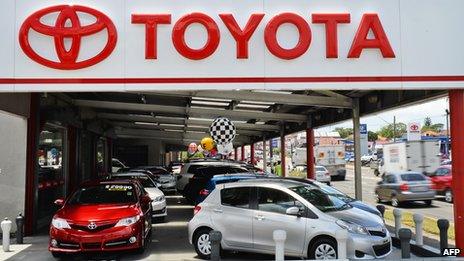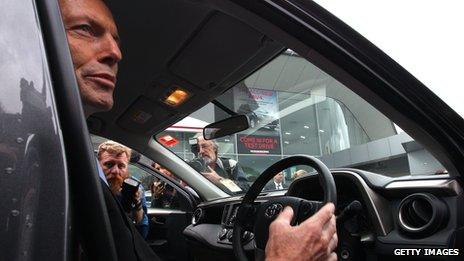Toyota to end car production in Australia by 2017
- Published

Toyota is one of the last remaining carmakers in Australia
Toyota is to end its vehicle and engine production in Australia by the end of 2017, effectively marking the end of the country's carmaking industry.
The company said, external it might scale down the operations of its development and technical centre in Australia as well.
Last year, Ford and General Motors' Holden unit also announced plans to stop producing cars in Australia.
About 2,500 jobs are set to be lost as a result of Toyota's decision, which it attributed to high manufacturing costs.
"We believed that we should continue producing vehicles in Australia, and Toyota and its workforce here made every effort," said Toyota president Akio Toyoda.
"However, various negative factors such as an extremely competitive market and a strong Australian dollar, together with forecasts of a reduction in the total scale of vehicle production in Australia, have forced us to make this painful decision."
The Japanese auto giant, which first began making cars in Australia in 1963, said it "intends to provide the best support it can, including employment assistance" to those affected by the decision.
Vivek Vaidya, an automotive analyst at consultancy Frost & Sullivan, said he was not surprised by Toyota's decision.
"Toyota was the last producer in Australia after exit of Mitsubishi, Ford and Holden," he said. "Labour cost in Australia is too high to be price competitive in production."
Mr Vaidya also said rival car-producing countries such as Thailand and the US were more attractive in terms of manufacturing costs.
'Disaster'

Australian Prime Minister Tony Abbott has appealed to Toyota to stay in the country
Toyota's decision comes despite appeals from Australian Prime Minister Tony Abbott, who has been looking to keep the carmaker operating in the country.
According to Australian public broadcaster ABC, upon hearing the news Mr Abbott, external said that "there will be better days in the future".
"Nothing we say or do can limit the devastation that so many people will feel at this point," he said.
"The important thing to remember is, while some businesses close, other businesses open, while some jobs end, other jobs start."
ABC also reported that Australian opposition leader Bill Shorten called Toyota's decision an "unmitigated disaster".
"The car industry has died under the Abbott government - it's a disgrace," he said.
Car manufacturers have been pulling out of Australia as the rising cost of doing business in the country has hit profits.
Last May, Ford said it would close its car lines in Australia in October 2016 with the loss of more than 1,000 jobs.
General Motors' Holden unit has also announced plans to stop production in 2017, affecting nearly 3,000 jobs.
Japan's Mitsubishi Motors sold its last Australian-made car in 2010.
'Devastating' decision
Australia's carmaking industry has traditionally received billions of dollars in subsidies from the government.
However, a national commission, external recently recommended that the financial support should be ended and that car companies should cut costs instead.
The Australian Manufacturing Workers Union (AMWU) called Toyota's decision "devastating" and warned the move could cause an economic recession.
"The magnitude of this decision in the community cannot be underestimated," AMWU National Vehicles Secretary Dave Smith said, external.
"We are looking at a potential recession all along the south-eastern seaboard.
"The government's lack of support for manufacturing workers and the communities they support is contrary to the national interest, will harm our economy and devastate communities," Mr Smith said.
Last year, Toyota - the world's top global car maker by sales - found itself in a dispute with Australian car plant workers over proposed changes to their contracts, in an attempt to reduce costs.
This included changes to overtime requirements and the removal of additional allowances to trained first-aid officers and workers who make blood donations.
In December, Australia's Federal Court blocked a vote on the contractual changes, which Toyota said it would appeal against.
A Toyota spokesman said there were no plans to withdraw that appeal, as it believed it had not violated any laws concerning the issue.
The Australian government weighed in last month, saying it would intervene in the dispute.